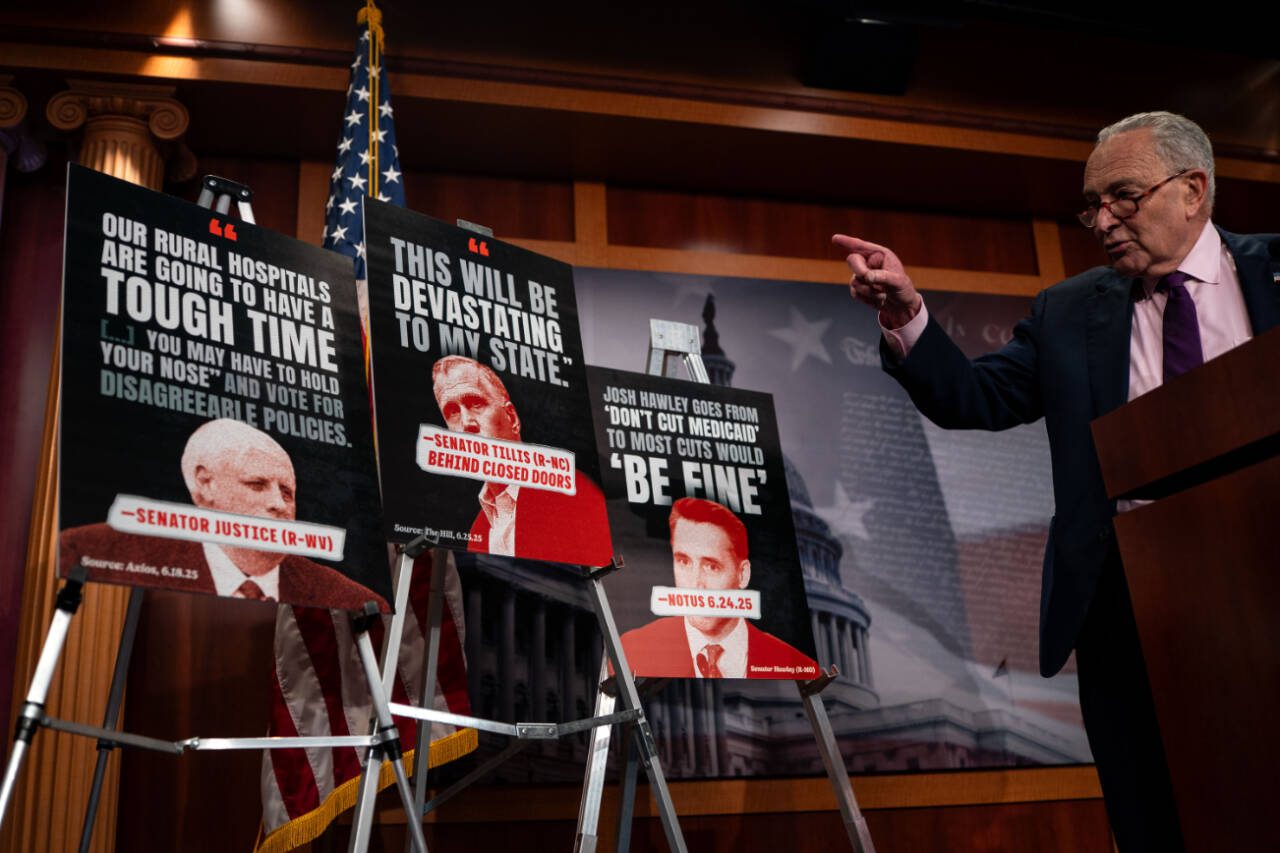By The Herald Editorial Board
This is how contentious things have gotten in the U.S. Senate over the so-called Big Beautiful Bill, as senators continued to slog through initial votes Monday to meet President Trump’s July 4 deadline: The “mom in tennis shoes” has taken to snark.
Sen. Patty Murray, Washington’s senior Democratic senator and typically among the Senate’s more bipartisan and consensus-seeking members, announced in an X post last week that she was going to try and communicate with her Republican colleagues in a new way. Posting, in the social media style of President Trump — all caps and with multiple exclamation points — Murray wrote (“decapitated” here to prevent eye strain) “GOP’s Big Ugly Bill kicks people off health care and food assistance. Hospitals will close. Kids with disabilities will lose caregivers. Big winners? Billionaires. Total fraud! It polls like garbage, because it is. GOP should drop it!! Thank you for your attention to this matter.”
Whether that works or not to reach Republicans in the Senate, Murray’s points against the bill — which seeks to make permanent the tax cuts adopted on Trump’s request in 2017, while also making deep cuts to Medicaid, SNAP and green energy incentives — are correct in the harm that will be inflicted across the country and in Washington state in order to deliver tax cuts for the nation’s wealthiest individuals and corporations.
As harmful as the bill was when it was adopted by the House in May, Senate Republicans have only intensified the pain. The nonpartisan Congressional Budget Office’s most recent “scoring” of the Senate legislation finds it would:
• Reduce funding for Medicaid, Medicare and Obamacare by $1.1 trillion, leaving about 11.8 million Americans without health coverage;
• Cap and gradually reduce a tax that states impose on Medicaid providers that is crucial to funding of rural hospitals;
• As it does for Medicaid funding, add work requirements to eligibility for the Supplemental Nutrition Assistance Program, formerly known as food stamps, eliminating benefits for 1.3 million low-income Americans each month; and
• Not wanting to leave future generations out of the pain, add more than $3.9 trillion to the national debt.
What those cuts and additional debt would “buy” are about $4.45 trillion in net tax cuts starting in 2026, 69 percent of which would go to the richest 20 percent of Americans, while only 10 percent would go to the middle fifth and 1 percent to the poorest fifth.
The richest 1 percent of Americans — those making more than $916,000 a year — would see an annual tax cut of nearly $65,000, according to analysis by the Institute on Taxation and Economic Policy. Those in the bottom fifth, making $27,000 or less a year, would receive a tax cut of about $110. But for the bottom 40 percent of American taxpayers, ITEP says, any net tax cut will be offset by cost increases resulting from President Trump’s changes to tariff policy.
Republicans have defended the cuts to Medicaid, SNAP and related programs as efforts to eliminate “waste, fraud and abuse,” preserving benefits for the truly deserving. But there isn’t $1.1 trillion of such waste, as almost all of those receiving Medicaid benefits are already working or are otherwise excused from work requirements, according to KFF. Of 26.1 million recipients, 44 percent work full time, 20 percent work part-time; 12 percent are care-givers; 10 percent are ill or disabled; 8 percent are retired and 7 percent are attending school.
What the bill’s supporters are counting on is the addition of paperwork requirements to discourage and confound those who are eligible from applying for and receiving benefits.
As for what the bill’s program cuts would mean in this Washington, state officials have estimated that some 194,000 will lose Medicaid coverage, totaling about $2 billion in funding over the next four years, Gov. Bob Ferguson said in May, as reported by the Washington State Standard. The state, the governor said, is in no financial position to make up the difference. As well, the cuts are expected to result in the closures of rural hospitals and nursing homes.
And it’s not just state Democrats raising alarms.
Twenty-three state Republican lawmakers — notably among them Sen. Ron Muzzall, R-Oak Harbor, and Sen. Keith Wagoner, R-Sedro-Woolley — sent a letter in May to all 10 members of the state’s congressional delegation, urging the U.S. Senate and House members to preserve Medicaid funding, noting that a quarter of all state residents are enrolled in Apple Health, the state’s Medicaid program.
“We can’t afford to lose local health care resources, and our rural communities will not be able to ride out the economic shockwaves that are sure to follow if this program is significantly cut,” the letter said.
The response from one of two state congressional Republicans was telling.
“Elections have consequences and the contrast between leadership in Washington DC and Washington state is stark,” Spokane Republican Rep. Michael Bumgartner wrote in a post on X that celebrated the House passage of the bill.
In Bumgartner’s 5th District, 30 percent of its residents are enrolled in Medicaid, second only to the 38 percent of 4th District residents enrolled and represented by fellow Republican Rep. Dan Newhouse.
Bumgartner is correct about the stark differences between federal and state levels of lawmaking, even among Republicans.
Borrowing from Sen. Murray’s snark: AS WITH ELECTIONS, CONGRESSMAN, VOTES IN CONGRESS HAVE CONSEQUENCES.
Talk to us
> Give us your news tips.
> Send us a letter to the editor.
> More Herald contact information.

























